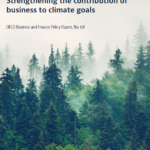In light of the COP30 outcomes on carbon markets, trade, agriculture, and just transition, companies urgently need to transform their value chains themselves. Possible solutions.?
The Decade of Implementation Begins in the Amazon
Ten Years After Paris: COP30 Belém Marks a Climate Turning Point
The international community gathered in Belém for COP30, dubbed the “COP of Truth.” Its mandate: transform climate commitments into concrete actions. This summit at the heart of the Amazon produced real progress, albeit mixed.
The “Global Mutirão”: Post-Paris Climate Roadmap
The flagship document of COP30 bears the name “Global Mutirão.” This Portuguese term, derived from the indigenous Tupi-Guarani language, symbolizes collective action toward common goals. It establishes a framework for climate finance, international trade, transparency and state ambition.
Strategic Implications for Global Businesses
For companies with international supply chains, COP30’s message is unequivocal: climate action can no longer wait. Organizations must now drive decarbonization across their entire value chains, and quickly. Decisions made regarding Article 6 of the Paris Protocol, international trade, agriculture and just transition create both regulatory constraints and competitive opportunities for visionary companies. Understanding these regulatory developments becomes essential for any climate adaptation strategy.
Critical COP30 Results: Progress, Gaps and Business Implications
The Global Mutirão Package: Ambition Meets Political Reality
COP30 committed to tripling climate adaptation finance by 2035, five years behind the initial target. This decision accompanies the launch of the “Belém Mission to 1.5°C,” a voluntary accelerator designed to speed up implementation of climate commitments. Despite this progress, the summit did not produce binding roadmaps on fossil fuels and deforestation. This result illustrates persistent divisions between developed and developing countries, as well as between fossil fuel exporters and states vulnerable to climate impacts. However, the commitment to triple adaptation spending nevertheless opens major opportunities for the private sector:
- Resilient Infrastructure: Increased public investment in adaptation projects
- Climate-Smart Agriculture: Enhanced funding for sustainable practices
- Resilient Supply Chains: Facilitated access to concessional financing
- Regulatory Compliance: Predictable tightening of environmental requirements
For companies, this paradigm shift signals an economic environment where climate resilience and competitiveness become inseparable.
Climate Finance: The $1.3 Trillion Challenge
The New Collective Quantified Goal (NCQG) sets an annual commitment of $300 billion. Developed countries must “provide” financial resources to developing countries to support their climate transition. This compromise reflects tensions between two visions: on one side, developing countries demanded robust public commitments; on the other, developed countries favor diversification of funding sources, with a central role for private capital. Beyond the $300 billion in public funds, the overall target of $1.3 trillion relies predominantly on private investment. This distribution transforms climate finance into a major strategic issue for companies, creating both increased responsibility and significant growth opportunities. Indeed, companies with supply chains in emerging markets must anticipate several structural developments:
- Blended Finance: Multiplication of public-private mechanisms to finance adaptation
- Enhanced Due Diligence: Obligations far exceeding simple carbon credit purchases
- Direct Contribution: Growing pressure to invest in adaptation of vulnerable areas in their value chains
- Project Development: Opportunities to structure bankable and profitable climate projects
The “Baku-Belém Roadmap” provides a mobilization framework. Companies should engage proactively in this process. Agriculture, manufacturing, infrastructure and extractive industries face particular pressure.
In-Depth Analysis: Article 6, Trade, Agriculture and Just Transition
Article 6 Carbon Markets: Marginal Progress, Persistent Concerns
COP30 addressed remaining administrative issues on Article 6. Two parallel tracks emerged with distinct implications.
Article 6.2: Persistent Uncertainties in International Carbon Markets
Article 6.2 of the Paris Agreement governs credit exchanges between states. However, all transfers made to date show “inconsistencies” during international technical reviews. COP30 merely noted these problems and demanded their resolution, with a request for more detailed explanations from reviewers. This creates major uncertainty for companies engaged in bilateral carbon transactions. Transaction validity remains questionable while future adjustments to credited reductions are possible. Faced with these risks, companies must strengthen their risk management and favor the most robust approaches in carbon program design and monitoring.
Article 6.4: Credit Permanence and Forestry Projects Under Pressure
Article 6.4 sparked controversial debates on permanence standards, particularly regarding management of carbon reversal risks. Concerns emerged that overly strict standards could exclude forestry projects from the mechanism. Faced with this pressure, countries rejected detailed guidance proposed by the supervisory body, refusing micromanagement of technical work. Despite these tensions, nature-based solutions (reforestation, forest conservation) remain eligible under Article 6.4. However, companies investing in forest conservation must ensure robust monitoring:
- Continuous Surveillance: Robust monitoring systems to detect carbon reversals
- Buffer Reserves: Constitution of sufficient reserves to cover potential storage losses
- Long-Term Engagement: Sustained involvement of local stakeholders to guarantee project integrity over decades
Climate Trade Measures: Extended Dialogue Until 2028
The Global Mutirão reaffirms fundamental principles of international trade: climate measures must constitute neither arbitrary discrimination nor disguised trade restrictions. This responds to developing country concerns about the EU’s CBAM (Carbon Border Adjustment Mechanism). COP30 established a dialogue process including the WTO that will extend until 2028. This extended timeline maintains regulatory uncertainty for exporting companies, particularly in carbon-intensive sectors exposed to international trade. Beyond simple regulatory compliance, implications for companies are substantial. Indeed, companies exporting carbon-intensive products must accelerate emissions reductions:
- Carbon Accounting: Comprehensive and verifiable measurement systems
- Trade Measures: Carbon pricing and increasing product standards
- Due Diligence: Growing requirements with enhanced traceability obligations throughout the value chain
- Multiplication of Sustainability Certifications: These processes take time to roll out across value chains. In the face of growing customs uncertainty, they provide guarantees of eligibility by improving understanding of the issues at stake, traceability of chains, and guarantees regarding the level of environmental and social standards achieved or at least expected.
Supply chain management complexity increases with multiplication of different jurisdictions on varied climate trade policies. Additionally, companies must establish robust data collection and verification systems on their supply chains to demonstrate multi-jurisdictional compliance. Companies proactively reducing their emissions gain competitive advantages.
Agriculture and Food Security: Blocked Ambition
Agricultural supply chains are facing a number of structural challenges that are being exacerbated by climate change. All businesses that rely on these supply chains for their activities should be extremely concerned about their future. Unfortunately, however, COP30 failed to produce any substantial results on agriculture. COP30 produced no substantial results on agriculture. Negotiations under the Sharm el-Sheikh Joint Work collapsed in the first week, revealing deep divisions on “holistic” and “systemic” approaches. Proposed language ranged from agroecology to AI applications. Some advocated Article 6 approaches to reward farmers. Blockages on climate finance aggravated these tensions, leading to postponement of discussions until mid-2026.
For food and agricultural companies, this creates challenges and despite the absence of multilateral consensus, food and agricultural companies cannot afford to wait.
- Growing Pressures: From consumers and investors
- Need to Assess Climate Risks: Changes to come are basically no less than cataclysmic, with huge transformational impacts on agricultural activities worldwide
- Progression of National Regulations remembering that climate action is now legally mandatory in international law
- Agricultural Transformation: Independent of UNFCCC progress, encouraging companies to develop science-based transition strategies: mitigation and adaptation measures on agricultural supply chains, technical and financial support for small farmers, supply diversification and regenerative agriculture to improve soil health and carbon sequestration.
Just Transition: The Belém Action Mechanism
The most celebrated result of COP30 is adoption of a just transition mechanism, hailed as a major victory by civil society. The mechanism will provide technical assistance and promote international cooperation to fill implementation gaps in equitable transitions. The final text includes requirements for meaningful participation where several stakeholder groups obtain formal recognition. A progressive rights-based framing covers labor and human rights. The right to a clean environment is recognized. Free, prior and informed consent becomes the standard.
These provisions establish principles that companies must integrate now with clear just transition planning requirements. For companies in energy, mining, manufacturing and heavy industry, implications are immediate. The mechanism creates accountability expectations while offering potential support pathways. Additionally, decarbonizing companies face new requirements:
- Social Impact Assessments: Systematic identification of workers and communities affected by decarbonization
- Comprehensive Transition Plans: Professional retraining programs and placement support
- Community Investment: Demonstration of concrete commitment in impacted territories
- Social Dialogue: Proactive involvement of workers, unions and local communities
Corporate Leadership: The Value Chain Transformation Imperative
Beyond Compliance: Strategic Opportunities in Climate Action
COP30’s mixed results underscore a fundamental reality. Companies cannot wait for comprehensive multilateral frameworks. On one side, diplomatic consensus lags behind climate urgency. On the other hand, the expectations of investors, consumers, and employees are accelerating. Civil society demands are becoming stronger with regard to the acceptability of projects, wealth creation in local areas, and adaptation to the climate changes experienced on a daily basis. Civil society demands grow stronger and this gap creates risks for companies delaying action and competitive advantages for proactive leaders.
In this context, value chain transformation exceeds simple regulatory compliance – with or without CS3DD for example. It represents strategic repositioning for long-term competitiveness. Climate action throughout supply chains offers multiple co-benefits: improved operational efficiency, strengthened risk mitigation and accelerated innovation. Talent attraction increases. Brand differentiation becomes possible. Emissions and climate impacts require value chain approaches. Scope 3 emissions far exceed direct operations. Climate-related supply disruptions increasingly threaten business continuity. Solutions require systematic supplier engagement. Competitors must collaborate on pre-competitive issues.
Multi-stakeholder partnerships become essential. Long-term supply chain investment cannot be deferred.
Ksapa’s Integrated Approach: From Strategy to Implementation
Ksapa: 25 Years of Sustainable Transformation Expertise
Ksapa combines strategic consulting, impact investment and advocacy to transform climate commitments into concrete results on the ground. Our approach integrates four dimensions essential to any effective transformation: technical feasibility, financial viability, stakeholder engagement and political alignment.
Operational Implementation
Implementation support extends across all value chains. For companies’ agricultural supply chains, we designn and deploy climate-smart programs compliant with international standards. We work directly with small farmers so productivity improves while environmental impacts decrease. Well-designed interventions simultaneously achieve multiple objectives, as we can see through our coconut and natural rubber programs:
- Improved environmental outcomes
- Increased farmer livelihoods
- Strengthened supply security
Just Transition in Industry: Supporting Decarbonization
Capital-intensive manufacturing receives just transition support. Our approach to move from equitable transitions to low-carbon systems relies on:
- Management of community impacts
- Essential stakeholder engagement to underpin our approach
- Social impact assessment and consideration in decisions
- Anticipation of regulatory requirements through clear rights-based frameworks
Financial Structuring: Mobilizing Capital for Transformation
Large-scale implementation of climate strategies requires capital far exceeding corporate balance sheets. Ksapa’s impact investment platform structures innovative financing solutions combining public and private resources. We access concessional financing from multilateral banks. Climate funds become accessible and pipelines of bankable projects attract institutional investment. Our expertise in navigating multilateral mechanisms helps companies access financing. We support development of projects meeting international fund requirements. Commercial returns simultaneously attract private capital.
Regarding Article 6 carbon markets, we provide end-to-end support:
- Development and validation of projects compliant with international standards
- Establishment of robust monitoring and verification systems
- Stakeholder engagement and benefit-sharing mechanisms
- Production of high-quality carbon credits generating financial and reputational value
Geographic Expertise: From Local Implementation to Global Scale
Ksapa’s global footprint enables transformation in diverse contexts. Our experience covers Africa, Asia, Latin America and developed markets, thus enabling significant regional depth in critical supply chain areas. Ksapa’s approach considers several aspects:
- Local Relevance: For the program to be effective it must be culturally appropriate. Institutional viability matters in local contexts and economic sustainability within communities is essential.
- Compliance: Alignment with global standards and investor expectations
Our multilingual capabilities ensure effective stakeholder engagement at all levels: culturally relevant support for farmers, participation of community leaders and government officials, agreements between development partners and partnerships between international companies and local organizations.
Ksapa responds to each expectation and capacity gaps are addressed while overcoming operational environment challenges. Furthermore, our SUTTI initiative clearly illustrates our integrated approach with small farmers. Technical assistance combines with financial services and market linkages strengthen. Thanks to Ksapa’s support for farmer organizations, capacities are strengthened, particularly through adoption of climate-smart practices. Additionally, we observe significant and measurable increases in livelihoods. Programs thus demonstrate income improvements for vulnerable populations. Corporate partners simultaneously gain supply chain resilience.
Conclusion: Partnership for Accelerated Action
COP30 reveals both progress and gaps. The 1.5°C window is rapidly closing. Emissions reductions of 43% by 2030 are required. By 2035, reductions of 60% compared to 2019 become necessary. This in a context where fossil fuel roadmaps remain absent. In response, unprecedented mobilization of corporate action is now required. Companies cannot wait for complete multilateral frameworks. The imperative is immediate:
- Develop science-based strategies now
- Implement urgent systematic value chain transformation
- Mobilize capital at scale
- Engage stakeholders throughout the transition
- Demonstrate measurable impact continuously
Belém developments create complex operating environments. Carbon markets, trade measures, agricultural systems and just transition are rapidly evolving while action is urgent. A sophisticated approach capable of embracing these concepts is indispensable. In response, Ksapa’s integrated approach enables confident movement from commitment to action. Strategic consulting combines with financial structuring. Implementation support covers the entire journey. We invite corporate leaders committed to climate leadership. Whatever your sustainability maturity – developing your first climate strategies, accelerating existing programs, accessing climate finance, transforming agricultural supply chains, implementing just transition approaches or building multi-stakeholder partnerships – Ksapa mobilizes its sectoral expertise, international networks and global reach to give momentum to your transformation.
Ksapa is ready to partner in this transformation.
Contact Ksapa today. Explore how our consulting and financial structuring services can accelerate your value chain transformation.
Credit: Pexel



































































































































































